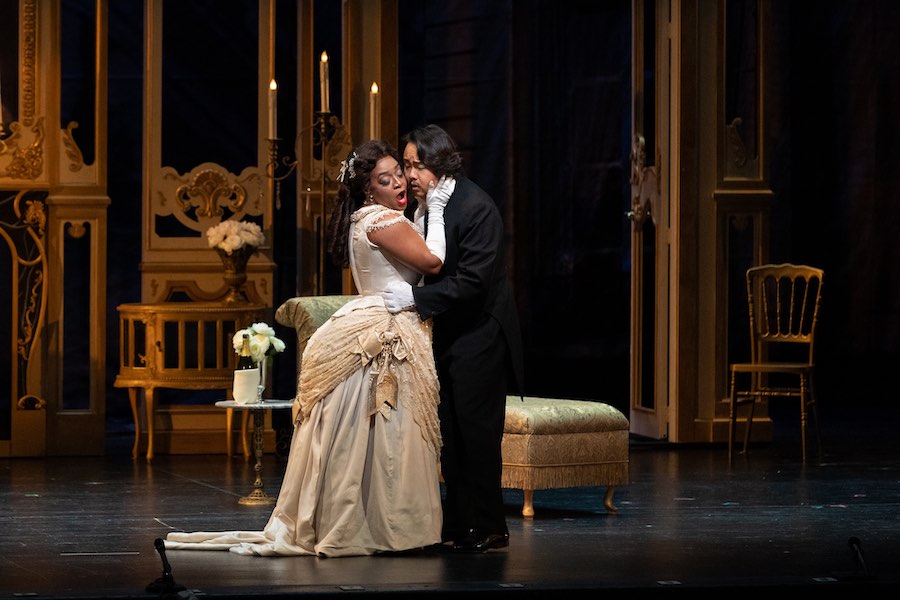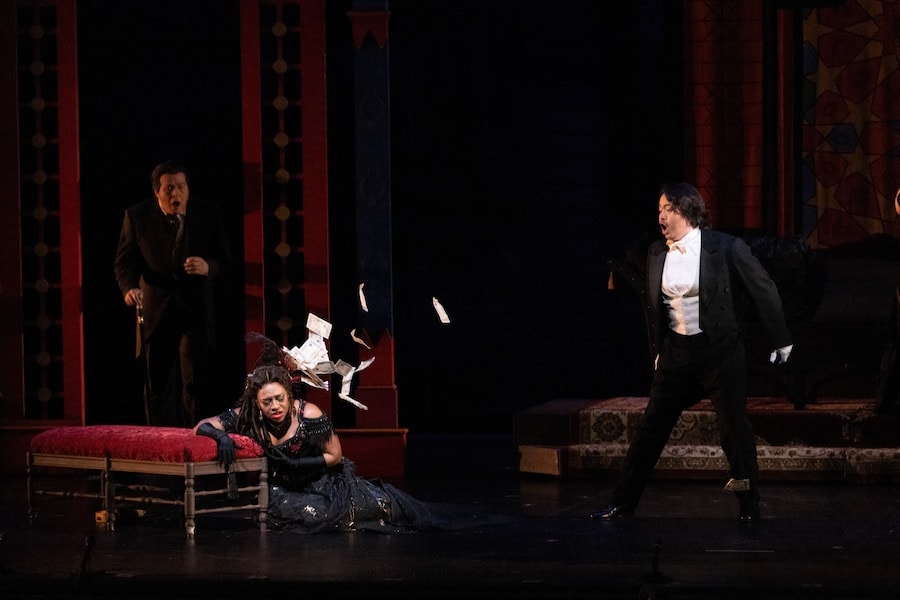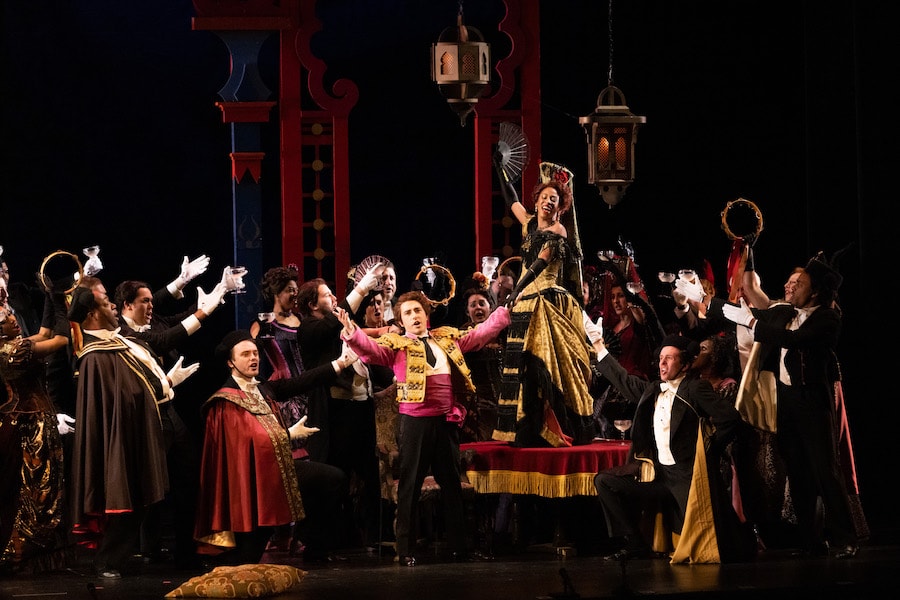If you change everything about yourself, perhaps a man will love you — or so the great tragedies of Grease and La Traviata tell us. The latter makes a magnificently melancholy finale to Virginia Opera’s 48th season with an epic, insightful performance of Violetta Valéry by Brandie Inez Sutton. The former, unfortunately, has the more redeemable libretto.
Despite the challenges of Francesco Maria Piave’s book — the editing of which could easily shave 40 minutes and save audience members from resenting Giuseppe Verdi forever — Virginia Opera’s remounting is a triumph, in large part because of Sutton’s nuanced and careful characterization of its complicated heroine.

In Act One, we meet Violetta, a courtesan hosting a rager at her Paris salon. At a time when women’s lives were dependent entirely upon the whims of men, her profession offers a small degree of freedom and autonomy compared with other women of the time. Though her livelihood remained in the hands of men, courtesans had more access to the upper echelons of society — heads of state, writers, artists, politicians — and could therefore wield more social, economic, and even political power than married or single women. Her salon reflects this — between the breathtaking scenic design by Robert Little and a strong chorus outfitted in elaborate costuming by John Lehmeyer, it is clear Violetta lives in luxury.
She meets Alfredo (Won Whi Choi), a bourgeois who claims to have loved Violetta for the past year despite never actually talking to her. Like the many lovers of Manic Pixie Dream Girls before and after him, Alfredo places Violetta on a pedestal without actually knowing her all too well. She tells him in the duet “Un dí felice” that she “cannot live up to such a heroic, poetic ideal” as he describes her and their love to be. He insists that if she gives up her life of independence and wealth, their love will sustain them. Violetta, who has recently recovered from tuberculosis, is tempted by this illusion of love.
Sutton then takes the audience on a journey through Violetta’s thoughts. Alone onstage, she expresses every hesitation and hope on her mind. Sutton’s voice is undeniably perfect, but what makes this performance worth seeing is her acting. This 15-minute stretch of the production is a masterclass in acting, and it is a testament to her as well as the direction by Tara Faircloth.
In this glorious finale to Act One, Violetta declares she will be forever free as she falls into her chaise defiantly.

Five minutes later, Violetta is, in fact, not free, having taken up with empty-headed Alfredo in the countryside. Act Two opens with Alfredo finding out that Violetta has had to sell many of her possessions in order to support their lifestyle. He is surprised that love cannot actually pay rent, so he runs off to Paris to arrange his finances, just before his father Giorgio (Grant Youngblood) arrives. He tells Violetta she needs to leave his son alone as her reputation is an impediment to his own daughter’s marriage. This first scene of Act Two is slow and repetitive through no fault of the creative team, but it is helped along by the chemistry between Youngblood and Sutton as well as by Artistic Director Adam Turner’s careful and mericifully up-tempo conducting of the Richmond Symphony Orchestra.
Violetta, moved by Giorgio’s love for his daughter, knows better than anyone how reputation can impede a woman’s chances at a happy life, and she agrees to give up her life with Alfredo for his sister, a woman we never meet. She leaves Alfredo, but she does not tell him why, so his fragile ego leads him to assume she has left him for the Baron (Erik Grendahl). Won Whi Choi’s performance makes Alfredo the vengeful man he clearly is, and his cruelty is evident in the second scene of the act where Flora (Taylor-Alexis Dupont) hosts an even more beautiful soirée than the last.
Little’s sets and Lehmeyer’s costumes steal the show again in this scene — the set transitions throughout, though long, are worth the wait as I felt utterly transported to 1850s Paris. Flora’s party was even grander than Violetta’s with a crimson-dripped homage to Ottoman architecture, featuring detailed lamps from above and heavily garnished costuming on the captivating ensemble. The chorus shines here, and this opera would be nothing without them or the stage management team who orchestrate these complicated transitions (production stage management by Karen T. Federing). Without either team, this staging would feel thin and forgettable. Opera is not possible without its many ensembles, and I would be remiss not to mention this is the last production for Ken Krantz, a bass who has grounded chori at Virginia Opera for the past 45 years.

The ensemble takes Alfredo to task when, in a jealous rage, he throws money at Violetta, claiming he’s now repaid any debt he may owe her. They criticize his outburst intended to shame her, and Giorgio also reappears to admonish his son for treating Violetta so cruelly. As Violetta finally starts to succumb to tuberculosis, Alfredo learns of what she did for his sister, and he and Giorgio are oddly praised as the two men Violetta loves most despite doing the most damage. Act Three is the slowest one yet, but Sutton’s final moments onstage mirror the Act One finale beautifully. Alfredo and Giorgio are now changed men and can live knowing they absolutely ruined this woman’s life for the sake of their own character development, paving the way for so many other male artists to do the same.
Running Time: Two hours and 40 minutes, including a 25-minute intermission.
La Traviata plays Friday, March 17, 2023, at 8 pm and Saturday, March 18 at 2:30 pm presented by Virginia Opera performing at the Carpenter Theatre, 600 E Grace Street, Richmond, VA. Tickets ($21.51–$130) can be bought online here.
The full program can be found here.





Well, that was… a review. Grease vs.Traviata? I suppose that’s… one way to look at it. A classic example of comparing apples to oranges, by someone who seems to know little about either. Grease (which I’ve never heard described as “a tragedy” by anyone before) has a book and lyrics. Traviata has a libretto… a very different animal. And the opera is one of the few standard rep works performed today with few or no cuts to the score… Often just the 2nd verses of Violetta’s two arias, and the baritone’s cabaletta. Critics and audiences agree that there is very little “fat” in the score that might improve it by cutting… Musically and dramatically it’s just about as perfect an opera as has been written. And I can pretty confidently promise you, no opera fan has sat through a performance of Traviata (even completely uncut) and left “resenting Verdi.”
Regarding Ms. Sutton’s portrayal of Violetta: when it’s the performer’s first time attempting the role, you probably want to tone down the hyperbole about how brilliant and nuanced the performance is… Nothing really new or cutting edge there.
No, in Act I Alfredo is NOT suggesting that Violetta give up her life of “independence and wealth”. He tells her that her fast-paced lifestyle amidst the hustle and bustle of the Paris demimonde is killing her and that if she had a man who truly loved her (and whom she could love) he would take her away from the city life that is causing her illness.
“Sutton’s voice is undeniably perfect”? That’s very much in the ear of the listener. Different sopranos sing Violetta different ways. That’s one of the things that makes the opera so enduring to fans of the genre, and makes the role so appealing to sopranos. Someone who understands a bit about voices would know that a “perfect voice” for Violetta may not be a “perfect voice” for many other roles. Violetta’s soliloquy at the end of Act I is a fairly common dramatic device in Italian operas of the period. And this performance of it was hardly a “masterclass in acting”… Dramatically, it was fairly standard, actually.
Alfredo is hardly empty-headed…. merely young and impetuous, and very passionately in love.
Maestro Turner’s conducting in Act II couldn’t really be described as “up tempo”… something that a person who actually knows and has seen/heard the opera before would likely realize. His tempi in general were on the slow side of average.
When it’s well-staged and sung, the drama of Traviata’s Act I, scene 1 is actually one of the most engaging and intense confrontations that Verdi ever wrote. The theme of fathers and daughters and how their relationships are pressured, tested and transformed by social expectations is a frequent subject that intrigued Verdi, and which he returned to over and over throughout his operas.
You make it sound like Violetta throws off the shackles of her courtesan life in Act I, only to put on new shackles in the country with Alfredo. That’s pretty obviously not the case… she is CHOOSING to live WITH a man who loves her, and whom she loves, rather than living FOR a succession of “protectors”/sugardaddies who pay her bills. You also seem to think that she agrees to give up Alfredo solely because of Germont’s pleas for his daughter’s future happiness. There’s a lot more to her motivations than that, much of which is pretty clearly stated in the text and/or implied in her singing.
The set changes/scene transitions were actually quick and efficient in this production… one of the benefits of this fairly sparse/barebones set. It’s not unusual at all for the stage curtain to come down for a few minutes while the scene is changed.
And you’re correct about the benefits of having a talented and capable stage management team, such as this one led by Ms. Federing… But this production of Traviata is far, FAR from being the most complicated opera production a stage team has ever had to run… You know there are really BIG and COMPLEX operas and opera productions out there, don’t you?
Traviata’s chorus music is sparkling and beautiful and greatly contributes to creating the mood and setting of the opera, and the Virginia Opera Chorus did a great job with it in this production… again, NOT particularly complicated or difficult (or lengthy) as opera choruses go. As engaging, popular and fun as this music is, Traviata is definitely NOT a “chorus opera”, as some others are. It’s silly to say that the opera would be “nothing” without the chorus music/scenes. There’s a lot of other GREAT music in Traviata besides the fun choruses, that tends to be more of a draw for the opera fan.
Alfredo is angry and bitter in Act II, 2, more so than vengeful. He’s very much in the mood to demand an explanation from Violetta… He is impetuous in crashing Flora’s party, and thoughtless when he believes she has abandoned him for Baron Douphol, and flings the money he’s won at gambling in Violetta’s face. He’s not trying to “take vengeance” on her, and that’s not what the party-goers get upset about. He grievously insults a beloved member of their group by publicly flinging money at her as if he was paying off a common prostitute… THAT’S what they get upset about. And he’s immediately sorry for it.
Actually, it’s not at all odd that Violetta describes Alfredo and Germont (and her maid Annina, and Doctor Grenvil himself) as the ones she loves most in the world… They are her family, quite probably the only real family she’s ever had. They are also the ones who came to stand by her as illness finally ends her life. If she resented their actions towards her she probably wouldn’t urge Alfredo to marry after she’s gone, should he fall in love again.
I have no idea what you mean about Alfredo and Giorgio, “paving the way for so many other male artists to do the same.” Literally nonsensical. While one could make an argument that Sandy at the end of Grease “changes herself so that a man will love her”, perhaps too much so… That’s not what Traviata is about at all.
Thanks for thinking so much about my review. The great thing about opera – and all art in general – is that two people can see the same thing and have totally different interpretations. For 170 years, that has been true of La Traviata, and it was clearly true of this production.
The chorus, stage management, and Violetta really were the best parts of this staging for me – I don’t think the existence of more complex productions makes the stage management work any less noteworthy here, and doing a role more than once does not necessarily makes someone better at it. Sutton was the strongest actor by far who gave a gorgeous, multifaceted performance that felt so grounded. She sang beautifully, sure, but her acting was what really sold it. And the chorus was so much fun to watch! It doesn’t need to be a “chorus opera” to be the most engaging part of a production. These are my opinions and interpretations – and it’s okay to have different ones!
Thanks again for sharing your thoughts, and I hope you continue watching opera in the DC area! I love opera, and it needs this sort of passion to keep it alive and discussed for years to come. It is my hope with this review that more people – particularly folks new to opera – will be interested in this beautiful form of storytelling and form their own opinions about these texts and stagings. Thanks again!